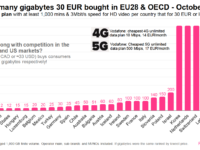Earlier today, the Liberal party convention approved (subject to a final vote) two stunning policy resolutions with enormous implications for freedom of expression. First, as discussed yesterday, it approved a resolution that seeks to “hold on-line information services accountable for the veracity of material published on their platforms and to limit publication only to material whose sources can be traced.” If enacted, the policy would undermine freedom of the press and could even spark widespread censorship on Internet platforms. In addition, it passed a resolution to develop “truth in political advertising” legislation to be administered by an oversight body. There are legitimate concerns about the “truthiness” of all political parties communications, but political truth oversight bodies carries great risk and is unlikely to foster enhanced public trust.
Post Tagged with: "liberal"
Why the Liberals Have Become the Most Anti-Internet Government in Canadian History
The Liberals led by Prime Minister Justin Trudeau were first elected in 2015 on a platform that emphasized transparency, consultation, and innovation. The signals were everywhere: it released ministerial mandate letters to demonstrate transparency, renamed the Minister of Industry to the Minister of Innovation, Science and Economic Development to point to the importance of an innovative economy, and soon after the cabinet was sworn in, Canadians were awash in public consultations (I recall participating in an almost instant consult on the Trans Pacific Partnership). With promises of entrenching net neutrality, prioritizing innovation, focusing on privacy rather than surveillance, and supporting freedom of expression, the government left little doubt about its preferred policy approach.
As I watched Canadian Heritage Minister Steven Guilbeault yesterday close the Action Summit to Combat Online Hate, I was left with whiplash as I thought back to those early days. Today’s Liberal government is unrecognizable by comparison as it today stands the most anti-Internet government in Canadian history:
- As it moves to create the Great Canadian Internet Firewall, net neutrality is out and mandated Internet blocking is in.
- Freedom of expression and due process is out, quick takedowns without independent review and increased liability are in.
- Innovation and new business models are out, CRTC regulation is in.
- Privacy reform is out, Internet taxation is in.
- Prioritizing consumer Internet access and affordability is out, reduced competition through mergers are in.
- And perhaps most troublingly, consultation and transparency are out, secrecy is in.
Wireless Worsens: Report Finds Canadian Wireless Pricing Now Less Competitive Compared to Other Developed Economies
The cost of wireless services emerged as a political issue during the recent national election, with most parties taking turns promising measures to increase competitiveness and lower consumer costs. The Liberals based their platform on a commitment to reduce costs by 25 per cent over the next two years, a measure that some analysts suggested had already been met. I argued that the 25 per cent reduction target was measuring the wrong thing, noting that “the 25 per cent price decline may sound attractive, but if other countries experience declines of 30 per cent or 40 per cent, it means that Canadians would actually be paying even more relative to consumers elsewhere.”
Platforms or People?: The Liberals and Conservatives Outline Competing Visions of Internet Responsibility
In recent years, there has been growing concern worldwide with the privacy risks associated with mass data collection online, the potential for rapid dissemination of hate speech and other harmful content on the Internet, and the competitive challenges posed by technology companies – often labelled “web giants” – that are enormously popular with the public but which do not fit neatly into conventional cultural and economic policies. My Globe and Mail op-ed argues the Internet policy proposals contained in the Liberal and Conservative platforms offer dramatically different answers to the question that sits at the heart of these policy issues: who should bear responsibility for the potential risks that arise from the Internet?
From Innovation to Regulation: Why the Liberals Have Lost Their Way on Digital Policy
The 2015 Liberal campaign platform that vaulted the party from third place to a majority government made a big economic bet that focusing on innovation would resonate with voters and address mounting concern over Canadian competitiveness. Innovation would serve as a guiding principle over the years that followed: The Minister of Industry was reframed as Minister of Innovation, Science and Economic Development, millions were invested in innovation superclusters and global leadership on artificial intelligence was touted as a national priority.
My Globe and Mail op-ed notes that four years later, the 2019 Liberal party platform does not include a single mention of innovation or AI. Instead, it is relying heavily on ill-fitting European policies to turn the Canadian digital space into one of the most heavily regulated in the world. Rather than positioning itself as the party of innovation, the Liberals are now the party of digital regulation with plans for new taxes, content regulation, takedown requirements, labour rules and a new layer of enforcement commissioners.




![La_Fête_à_Macron,_5_mai_2018_—_74 by Jules Xénard [CC BY-SA 4.0 (https://creativecommons.org/licenses/by-sa/4.0)]](https://www.michaelgeist.ca/wp-content/uploads/2019/10/La_Fête_à_Macron_5_mai_2018_—_74-200x150.jpg)






